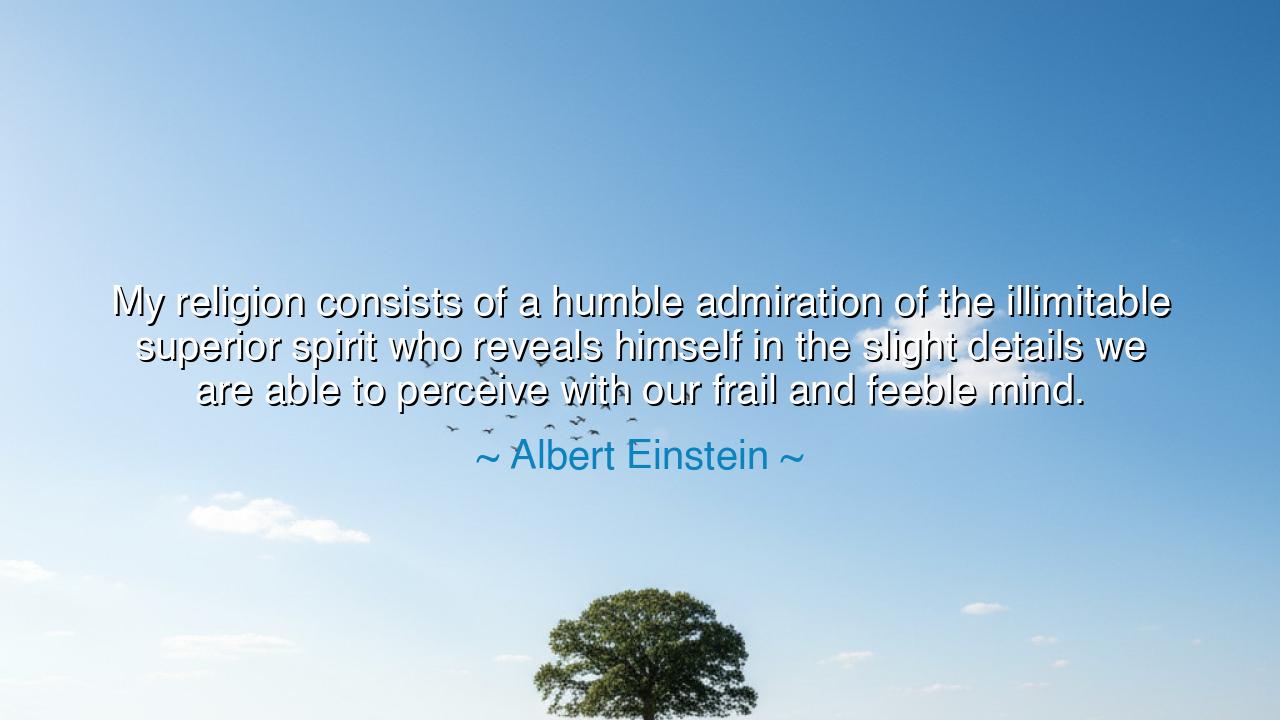
My religion consists of a humble admiration of the illimitable
My religion consists of a humble admiration of the illimitable superior spirit who reveals himself in the slight details we are able to perceive with our frail and feeble mind.






In the quiet grandeur of his intellect, Albert Einstein once uttered words that bridged science and spirit: “My religion consists of a humble admiration of the illimitable superior spirit who reveals himself in the slight details we are able to perceive with our frail and feeble mind.” These words are not the proclamation of a theologian, but the confession of a seeker — one who gazed into the cosmos not for proof of power, but for traces of wonder. Einstein’s religion was not confined to dogma or ritual; it was a reverence born from awe, a surrender to the infinite harmony that pervades the universe. His was a faith in the mystery of existence, not as something to be conquered, but as something to be humbly adored.
This quote was born of Einstein’s lifelong meditation on the relationship between science and the divine. To him, the more one understood the laws of the cosmos, the more one was struck by their subtle order — a beauty too profound to have arisen by chance. He did not worship a personal god who intervened in human affairs, but he believed in what he called the “cosmic religious feeling” — the trembling awe that arises when we behold the stars, the structure of atoms, or the fragile miracle of life. In that feeling, he saw the trace of an illimitable superior spirit, a presence that reveals itself not in thunder or commandments, but in the silent precision of creation itself.
To admire humbly — that was Einstein’s prayer. He knew that human knowledge, no matter how vast, could only touch the hem of infinity. Even with all our instruments and equations, our minds are but flickering lamps trying to comprehend the sun. Yet it is precisely this humility that opens the door to true wisdom. The arrogant mind seeks to own truth; the humble mind bows before it. To live with such humility is to be constantly in awe — to see divinity in a snowflake’s symmetry, in the rhythm of waves, in the birth of a child, or in the silent dance of galaxies beyond counting.
Consider the story of Isaac Newton, who, after discovering the law of gravitation, did not boast of mastery over nature but fell to his knees in wonder. “I seem to have been only like a boy playing on the seashore,” he wrote, “while the great ocean of truth lay all undiscovered before me.” In that moment of humility, Newton stood shoulder to shoulder with Einstein across the centuries. Both men understood that true knowledge does not banish mystery — it deepens it. The greater the light of understanding, the more infinite the shadow of the unknown becomes.
Einstein’s words also serve as a rebuke to arrogance — both religious and scientific. For in every age, there are those who claim to have captured truth in their net, whether through scripture or formula. Yet Einstein reminds us that our minds are frail and feeble, and our perception of the divine — or of reality itself — is but a faint glimpse of something beyond comprehension. The moment we claim certainty, we lose reverence. The moment we cease to admire, we cease to grow. Thus, the truest religion is not about possession of truth, but about an ongoing dialogue with it — a dance between knowing and wonder, discovery and devotion.
From this understanding arises a sacred way of living: to walk through the world with eyes open and heart bowed. The wise do not demand miracles; they see them everywhere. In the atom’s structure, in the flight of birds, in the quiet logic of mathematics, they perceive not chaos, but purpose — not emptiness, but presence. To live this way is to make of one’s life a temple, and of every day a prayer. It is to understand that we are both insignificant and magnificent — specks of dust capable of glimpsing eternity.
So, my children, let this be your lesson: seek knowledge, but seek it with reverence. Do not look to science to destroy wonder, nor to faith to silence curiosity. Let both be your teachers. When you look upon the night sky, remember that your mind, though small, is made of the same stardust as the universe it beholds. When you ponder the mysteries of life, do not demand answers — cultivate admiration. For in that humble admiration lies the bridge between the human and the divine, between the seeker and the eternal.
In the end, Einstein’s religion was not a creed but a way of seeing — to live in awe of the infinite, to recognize our smallness without despair, and to love the mystery that surrounds us. Walk in this spirit, and every breath will become worship, every discovery a revelation, and every moment — no matter how ordinary — a glimpse of the illimitable superior spirit that speaks through all things.






AAdministratorAdministrator
Welcome, honored guests. Please leave a comment, we will respond soon